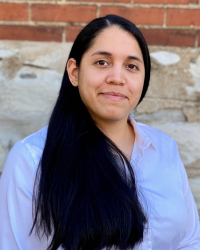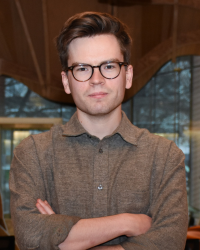2024 Awardees

Kaitlyn M. Berry, Ph.D., M.P.H.
University of Minnesota School of Public Health
Project Title: Place-Based Influences on Mortality Among People Experiencing Homelessness
Grant ID: DP5-OD037332
Kaitlyn M. Berry is an Assistant Professor in the Division of Epidemiology and Community Health at the University of Minnesota School of Public Health and a faculty member of the Minnesota Population Center. She completed her Master’s in Public Health at the Boston University School of Public Health and her PhD in Epidemiology at the University of Minnesota School of Public Health. As a social epidemiologist and population health scientist, Dr. Berry’s research investigates how social policy and other modifiable place-based factors shape health and health inequities. For example, one area of her research evaluates the health impact of policies that target people with criminal records and make it harder to obtain employment, access public benefits, apply for public housing, and more. Dr. Berry’s Early Independence Award project research will identify potential policy avenues that could bring to bear improved health and reduced mortality for people experiencing homelessness across the U.S.

M. Catalina Camacho, Ph.D.
Washington University in St. Louis School of Medicine
Project Title: A Computational Model for How Risk for Anxiety and Depression Influences Affective Neurodevelopment
Grant ID: DP5-OD037370
Dr. M. Catalina "Cat" Camacho is a neuroscientist at Washington University in St. Louis and studies the neurodevelopmental etiology of anxiety and depression. She received her BA in Psychology (Health and Development) from Stanford University in 2014 and her PhD in Neuroscience (emphasis on Cognitive, Systems, and Computational Neuroscience) from Washington University in St. Louis School of Medicine in 2022. Dr. Camacho's current line of research characterizes how risk factors for anxiety and depression (such as early experiences and temperament) are associated with naturalistic neural social information processing across the preschool period. Her long term goal is to use naturalistic measurements and computational modeling to identify individualized mechanisms of neurodevelopmental risk for anxiety and depression. She hopes these tools and information can eventually help clinicians and parents better support children's social development and emotional health.

Alexandrea L. Craft, Ph.D., L.C.P.
Women and Infants Hospital of Rhode Island and Warren Alpert Medical School of Brown University
Project Title: Juggling Roles: A Study of Diverse Neonatal Intensive Care Unit Parents and Their Work-Family Transition
Grant ID: DP5-OD037403
Dr. Alexandrea L. Craft is a Licensed Clinical Psychologist at Women and Infants Hospital of Rhode Island and an Assistant Professor in the Departments of Pediatrics and Psychiatry & Human Behavior at the Warren Alpert Medical School of Brown University. Prior to arriving at Brown, she completed her undergraduate degree at Boston University, then her PhD studies at the University of Massachusetts Amherst in the lab of Dr. Maureen Perry-Jenkins and her Internship/Residency at the Children’s Hospital of Philadelphia (CHOP). Dr. Craft’s research to date has focused on understanding how social contexts (e.g., social class and race) and individual differences (e.g., risk and resiliency) shape the behaviors and perceptions of underrepresented, underserved, and vulnerable populations. Specifically, she has focused on understanding how adversity is experienced psychologically and physically by mothers and fathers in the prenatal period, and how adversity is transmitted to infants through parents’ behaviors and stress hormones during the perinatal period. Her long-term objective is to develop and implement interventions to address perinatal health disparities and support new parents and children with the belief that if we can engage caregivers in needed intervention early in the perinatal period, we can intervene during a critical period of child development to promote positive long-term outcomes for children and caregivers.

Megan L. Ken, M.D., Ph.D.
The Scripps Research Institute
Project Title: Predictive Modeling of Viral RNA Cellular Behavior
Grant ID: DP5-OD037420
Megan L Ken is a Scripps Fellow in the Department of Integrative Structural and Computational Biology at The Scripps Research Institute, La Jolla. Megan received her M.D., Ph.D. at Duke University School of Medicine, where she studied RNA ensemble dynamics and small-molecule RNA targeting in Dr. Hashim Al-Hashimi's lab. The Ken lab is interested in combining computational and experimental approaches to examine RNA structure-function relationships in vitro and in the cellular context. We aim to build quantitative models of cellular RNA-protein interactions that allow us to gain deeper understanding of fundamental biology as well as develop novel RNA-targeting strategies. While these tools and approaches can be be applied broadly, we are primarily focused on viral RNAs and antiviral drug development.

Kelton Minor, Ph.D.
Columbia University
Project Title: The Behavioral Cost of Carbon
Grant ID: DP5-OD037400
Kelton Minor was an undergraduate Merrill Presidential Scholar at Cornell University where he received his M.S. in Human Environment Relations, and was a US-Denmark Fulbright Grantee. He received a Ph.D. in Planetary Social and Behavioral Data Science at the University of Copenhagen, was an Elite Research Grant visiting researcher at the University of California Berkeley, and conducted his Postdoctoral training at Columbia University’s Data Science Institute. Dr. Minor applies advances in large-scale personal sensing and environmental data science to understand health-related behavioral responses to climate stressors, globally. His Observatory aims to monitor the behavioral and mental health impacts of planetary-scale environmental changes to inform both mitigation and adaptation.

Sedona Murphy, Ph.D.
Yale School of Medicine
Project Title: Spatial Regulation of Epigenetic Memory
Grant ID: DP5-OD037361
Sedona Murphy is a Yale School of Medicine Science Fellow in the department of Cell Biology. She received her undergraduate degree in Biology from Haverford College and completed her Ph.D. in Dr. Alistair Boettiger's lab at Stanford University. Her graduate work focused on the role of chromatin organization in gene repression, specifically focused on Polycomb repression of Hox genes. Her current research aims to understand the biophysical feedback between chromatin organization and epigenetic memory during development. Sedona plans to develop new microscopy-based tools to measure how epigenetic modifiers alter chromatin folding in single cells and at tissue-scale will the ultimate goal of dissecting cell-type and locus-specific regulation of gene repression by Polycomb group proteins.

Aditya Raguram, Ph.D.
Whitehead Institute for Biomedical Research
Project Title: Leveraging Cell-Derived Bioparticles for Macromolecular Delivery
Grant ID: DP5-OD037342
Aditya Raguram is a Whitehead Fellow and Principal Investigator at the Whitehead Institute for Biomedical Research. He earned an A.B. in Chemistry & Physics from Harvard College and a Ph.D. in Chemical Biology from Harvard University. Previously, as a graduate student with Prof. David R. Liu at Harvard University and the Broad Institute, Aditya developed new technologies for precision genome editing and protein delivery, including engineered virus-like particles (eVLPs). Currently, the Raguram Lab's research focuses on the study and manipulation of cell-derived bioparticles to enable next-generation macromolecular delivery modalities and potential therapies for genetic disorders (https://www.raguramlab.org/).

Andrew J. Rech, M.D., Ph.D.
University of Pennsylvania
Project Title: Response and Resistance to Chimeric Antigen Receptor T Cell Therapy in Human Solid Tumors Using Spatial Multi-Omics
Grant ID: DP5-OD037346
Andrew J. Rech, MD, PhD is a scientist studying human immunology at the University of Pennsylvania and a board-certified clinical pathologist. His research integrates wet lab and computational approaches to study immune interactions within complex tissue microenvironments. Dr. Rech has explored the molecular mechanisms behind response and resistance to immunotherapy using murine tumor models and has investigated the genomic and transcriptomic factors that influence immune responses to tumors. His current work focuses on using spatial biology techniques to analyze human samples from clinical trials of CAR T cells in both liquid and solid tumors, uncovering the complex interactions that drive therapeutic outcomes. His ultimate goal is to translate these findings into clinical applications by engineering cellular therapies that can effectively modulate immune processes for therapeutic benefit.

Shawn A. Rhoads, Ph.D.
Icahn School of Medicine at Mount Sinai
Project Title: A Hierarchical Examination of the Neural and Computational Mechanisms Underlying Loneliness
Grant ID: DP5-OD037383
Shawn A. Rhoads, Ph.D. is an Assistant Professor at the Icahn School of Medicine at Mount Sinai. He earned his baccalaureate degree from the University of Southern California and Ph.D. from Georgetown University. His research program unpacks the factors that impair or improve the well-being of self and others across multiple levels of analysis (e.g., neurobiological, cognitive, behavioral, interpersonal, societal). Specifically, his laboratory uses a combination of methods—including computational modeling, neuroimaging, and intracranial recordings—to investigate the neurocomputational basis of human social connection and loneliness, with a focus on characterizing individual variability in perception, learning, and decision-making across interpersonal experiences. The overarching aim of his work is to translate these insights for application in healthcare and policy.

Violeta J. Rodriguez, Ph.D., M.S.Ed.
University of Illinois Urbana Champaign
Project Title: Optimizing the Assessment of Parenting: A Multi-Method and Multi-Informant Approach
Grant ID: DP5-OD036508
Dr. Violeta J. Rodriguez is an Assistant Professor in the Clinical-Community area of the Department of Psychology at the University of Illinois Urbana-Champaign. She earned her PhD in Clinical Psychology from the University of Georgia, completed her predoctoral internship at the University of Illinois at Chicago, and obtained a master's degree in Measurement, Research, and Evaluation from the University of Miami. Her research focuses on identifying ecodevelopmental processes like parenting that contribute to psychopathology in parents and youth within communities affected by global health disparities. She is committed to advancing the measurement of these processes through culturally responsive psychometric methods and translating evidence-based health promotion strategies into underserved settings. Central to her work is promoting health equity, particularly among ethnoracially minoritized parents, sexual and gender minorities (SGM), and communities in the global south.

Michael Skinnider, M.D., Ph.D.
Princeton University
Project Title: A Machine-Learning Platform to Illuminate the Chemical Dark Matter in Mass Spectrometry-Based Metabolomics
Grant ID: DP5-OD036960
Michael Skinnider received his undergraduate degree from McMaster University and a MD/PhD from the University of British Columbia, during which time he was also a visiting PhD student at the École Polytechnique Fédérale de Lausanne. He then started his laboratory in the Ludwig Institute for Cancer Research and the Lewis-Sigler Institute for Integrative Genomics at Princeton University. His research focuses on the application of machine learning to problems in biology, chemistry, and medicine, with a particular focus on small molecule discovery via mass spectrometry-based metabolomics.

Jacob Zavatone-Veth, Ph.D.
Harvard University
Project Title: Understanding Data-Driven Models for Neural Dynamics
Grant ID: DP5-OD037354
Jacob Zavatone-Veth is a Junior Fellow of the Harvard Society of Fellows. His research is broadly focused on the theory of neural computation, with particular emphasis on how representations and dynamics are learned. He was first introduced to neuroscience during his undergraduate work in physics at Yale, where he studied visual motion detection and locomotor coordination in fruit flies with Damon Clark. He then came to Harvard for his Ph.D.; his doctoral work with Cengiz Pehlevan applied tools from statistical physics to investigate the structure of learned representations in natural and artificial neural networks.



